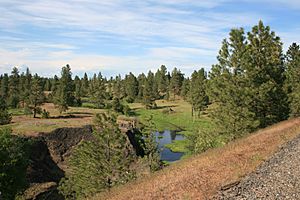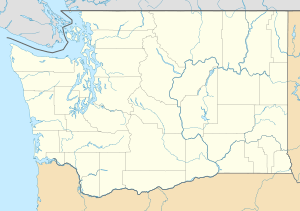Turnbull National Wildlife Refuge facts for kids
Quick facts for kids Turnbull National Wildlife Refuge |
|
|---|---|
|
IUCN Category IV (Habitat/Species Management Area)
|
|
 |
|
| Location | Spokane County, Washington |
| Nearest city | Cheney, Washington |
| Area | 18,684.98 acres (7,561.54 ha) |
| Established | 1937 |
| Governing body | United States Fish and Wildlife Service |
| Website | Turnbull National Wildlife Refuge |
The Turnbull National Wildlife Refuge is a special natural area in Spokane County, northeastern Washington. It's about 6 miles (10 km) south of Cheney, Washington. This refuge covers over 18,000 acres (7,284 hectares) of land known as the Channeled Scablands.
Turnbull NWR is a unique place. It has a mix of rocky areas, deep canyons, and ponderosa pine forests. You'll also find more than 130 marshes, wetlands, and lakes here. This mix creates a beautiful home for many types of wildlife. The refuge is named after Cyrus Turnbull, who lived in this area in the 1880s.
Contents
How the Land Was Formed: Geology of Turnbull
The refuge is located in the Channeled Scablands. This amazing landscape was created about 16,000 years ago. Giant floods, called the Missoula Floods, shaped it during the last ice age. Powerful forces like volcanoes and glaciers also helped form this unique environment.
The refuge is a meeting point between two different types of land. To the west, you'll find the dry, sagebrush grasslands of the Columbia Basin. To the east, the land rises into the forested Selkirk and Bitterroot ranges. This mix of environments makes Turnbull NWR very special.
Wetlands: A Watery Home
Turnbull NWR has about 3,036 acres (1,229 hectares) of wetlands. These wetlands are super important for waterfowl, like ducks and geese. They provide some of the last good breeding spots in eastern Washington. Many waterfowl populations have decreased because their homes are being lost. The wetlands at Turnbull help protect these birds.
Wildlife and Habitat: A Safe Place for Animals
The Turnbull National Wildlife Refuge was created in 1937. President Franklin D. Roosevelt signed an order to make it a safe place. Its main purpose is to provide good breeding and nesting areas for migratory birds and other wildlife.
The natural environment here is very special. It's different from many other nature reserves around the world. The mix of dry grasslands and timbered mountains creates excellent homes for many animals. The 3,036 acres (12 square kilometers) of wetlands are especially important. They offer crucial breeding grounds for waterfowl in eastern Washington.
Visiting the Refuge: Access and Trails
You can visit the refuge using the Columbia Plateau Trail. There's also a special path called the Pine Lake Loop Trail. This trail was named a National Recreation Trail in 2006. It's about 1.25 miles (2 kilometers) long. The best part is that it's designed for wheelchairs, making it easy for everyone to enjoy the views around Winslow Pool and Pine Lake.
 | Georgia Louise Harris Brown |
 | Julian Abele |
 | Norma Merrick Sklarek |
 | William Sidney Pittman |


